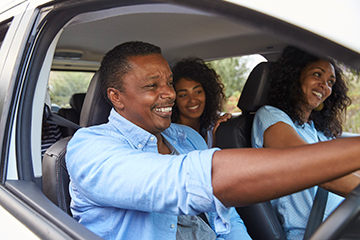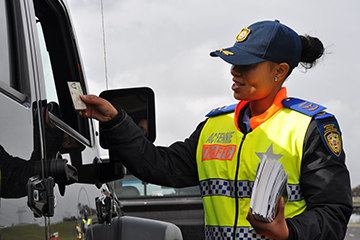Stay safe on the road this Easter
With the Easter weekend, we can expect high traffic volumes, as many of us will be on the roads heading to holiday spots or visiting family and friends all over the country.
We urge all citizens to drive responsibly and use these handy tips to help make your journey as safe as possible.
Before planning your trip, please take into consideration these important upcoming dates:
- Easter Weekend: 7 April 2023 - 10 April 2023
- Freedom Day: 27 April 2023
- Worker's Day: 01 May 2023

Before your trip
- Plan your trips. This allows you time to decide which roads to use and can help you avoid poor weather and high accident zones.
- Have your car serviced by a qualified service mechanic to make sure your vehicle is roadworthy before departure.
Inspect all lights, indicators, wipers, brakes, steering, exhaust system, and tyres for faults.
On the road
- Always make sure that you and your passengers buckle up. Here's more information on seatbelt safety.
- Keep a safe following distance, this will give you enough time to react in case of an emergency.
- Always check your blind spot before changing lanes, even when driving on a deserted road.
- Always be cautious when approaching a railway crossing. Be sure to slow down and proceed only when it's safe.
- Before undertaking a journey, consult your doctor to find out if the medication that you’re taking can cause side effects like drowsiness.
- Stay alert and keep an eye on what's happening around you.
- Always be prepared. Carry an emergency kit with items that would come in handy if you're stranded on the side of the road or involved in a vehicle accident.
- Try to recognise potentially dangerous drivers and pedestrians along the road and keep well clear of them. Find out more on pedestrian safety.
- Look out for potholes and animals, which frequently stray into the road, especially in rural areas. Be cautious when driving alone and avoid stopping in remote areas.
- Remain alert to any areas that might present a threat of criminal activity, such as hijackings and smash-and-grabs.
#NoWhereToHide
Things to avoid while driving
- Never drink and drive. Find out more about the blood/alcohol limit.
- Avoid distractions while driving. For example, install a hands-free kit in your car instead of using your cell phone. Find out more.
- Don’t continue your journey if you're feeling tired. Take leg-stretch breaks every two hours or 200km.
- Avoid driving at or after sundown, especially when there are rainstorms, which cause poor visibility.
- Never disobey road signs. Always stay within the speed limit.
- Always place your valuables like cell phones and wallets in the boot of your car.
Public transport safety
Many people also use public transport services to get home or to their holiday destinations. However, even though you aren't behind the steering wheel, you need to take the necessary precautions to stay safe on the road. Here are some tips:
- Plan your journey. Including the modes of transport you intend on using. Familiarise yourself with public transport routes and operating times.
- Stay alert to your surroundings and keep your valuables where you can see it. If you carry a handbag or backpack, ensure the strap(s) are secure and strong.
- Ensure that you know the distance, direction, and travel time to your final destination.
- Be alert at all times while travelling on public transport. Don’t fall asleep while using public transport, especially when travelling alone.
- Maintain a schedule that ensures there are enough people at your bus or train stop. If someone follows you when you exit a vehicle /station, go to the nearest well-lit populated area, call the police, or scream for help.
For more about the safety of passengers on public transport, you can read the public transport passenger safety information.
Visit the Safely Home website for more safety tips.
Some emergency numbers:
- Police Flying Squad: 10111
- Ambulance: 10177
- Crime Stop: 08600 10111
- Cell phone Emergency: 112 (MTN, Vodacom and Cell C)
- ER24: 084 124
- Netcare: 082 911
- National Traffic Call Centre Number: 0861 400 800
Emergency information and numbers are also available at Safely Home.



